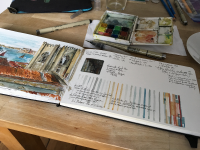 This space, therefore, has huge symbolic significance as a place to host an exhibition about contemporary prisons, and it matters that the two distinct narratives are not confounded. The Portuguese Prison Photo Project invites its viewers to consider the work of two photographers on regular prisons in Democratic Portugal of the 21st century, accompanied by other photographs of prisons selected from diverse national archives.
This space, therefore, has huge symbolic significance as a place to host an exhibition about contemporary prisons, and it matters that the two distinct narratives are not confounded. The Portuguese Prison Photo Project invites its viewers to consider the work of two photographers on regular prisons in Democratic Portugal of the 21st century, accompanied by other photographs of prisons selected from diverse national archives.
19.08.2019 | by Fátima da Cruz Rodrigues
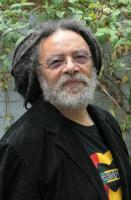 My talk will discuss the altered ecology of belonging that has emerged into Africa’s diasporas during the decades since “Black Atlantic” was published. My discussion of the problems that this has raised will centre on several key themes. They include the fortification of the overdeveloped countries, the impact of new communicative technologies on conceptions of solidarity, relationality and mutuality, the resurgence of extractive capitalism, and the export of generic racial identities from the USA to the whole world.
My talk will discuss the altered ecology of belonging that has emerged into Africa’s diasporas during the decades since “Black Atlantic” was published. My discussion of the problems that this has raised will centre on several key themes. They include the fortification of the overdeveloped countries, the impact of new communicative technologies on conceptions of solidarity, relationality and mutuality, the resurgence of extractive capitalism, and the export of generic racial identities from the USA to the whole world.
08.07.2019 | by vários
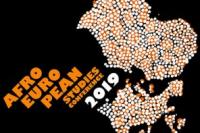 The title of the conference incorporates the tensions, ambiguities and paradoxes of Blackness in Europe. At the same time as black histories, cultures and social conditions are made invisible in hegemonic accounts on Europe, there is a hypervisibility and presence of black stereotyping in European popular culture. Also, while the concept of race has largely disappeared from political, sociological and administrative discourses (in continental Europe), and while the disengagement with institutional and structural racism has been reframed in new capitalist post racial rhetorics, racial markers still have currency, and black bodies continue to be invoked as either tolerated guests at best, or threatening intruders at worst. The consequence is the practice of “embodying an identity that is declared impossible even though lived by millions”, namely as non-white Europeans, and specifically as Black Europeans. This identity has become even more conditioned by a new mainstreaming of right-wing discourses and the tightening immigrant and refugee policies that affect people of African descent.
The title of the conference incorporates the tensions, ambiguities and paradoxes of Blackness in Europe. At the same time as black histories, cultures and social conditions are made invisible in hegemonic accounts on Europe, there is a hypervisibility and presence of black stereotyping in European popular culture. Also, while the concept of race has largely disappeared from political, sociological and administrative discourses (in continental Europe), and while the disengagement with institutional and structural racism has been reframed in new capitalist post racial rhetorics, racial markers still have currency, and black bodies continue to be invoked as either tolerated guests at best, or threatening intruders at worst. The consequence is the practice of “embodying an identity that is declared impossible even though lived by millions”, namely as non-white Europeans, and specifically as Black Europeans. This identity has become even more conditioned by a new mainstreaming of right-wing discourses and the tightening immigrant and refugee policies that affect people of African descent.
24.06.2019 | by vários
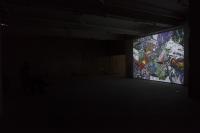 The exhibition Lost Lover speaks about the political, historical and geographical conditions through which knowledge is produced and controlled. The screening program assembled by Lara Koseff was originally presented in Rio de Janeiro, in the courtyard of Lanchonete, now in Rampa, Porto.
In the front room, 11 single-channel video pieces are projected in a loop. The authors, who are mostly from South Africa, confront us with the abandon of fear, thus calling to action topics that are often and strategically silenced.
The exhibition Lost Lover speaks about the political, historical and geographical conditions through which knowledge is produced and controlled. The screening program assembled by Lara Koseff was originally presented in Rio de Janeiro, in the courtyard of Lanchonete, now in Rampa, Porto.
In the front room, 11 single-channel video pieces are projected in a loop. The authors, who are mostly from South Africa, confront us with the abandon of fear, thus calling to action topics that are often and strategically silenced.
12.06.2019 | by Eduarda Neves
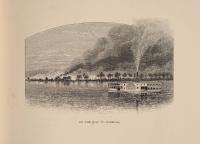 The title of the exhibition refers to Trotsky’s theory of uneven and combined development and, particularly, to its rereading by Harvey through the concept of “uneven geographical development”. If Marx considers that space is annihilated by time in the capitalist system, The Unbalanced Land carries out a reflection on the modalities of space production and the spatio-temporal relations in late capitalism.
The title of the exhibition refers to Trotsky’s theory of uneven and combined development and, particularly, to its rereading by Harvey through the concept of “uneven geographical development”. If Marx considers that space is annihilated by time in the capitalist system, The Unbalanced Land carries out a reflection on the modalities of space production and the spatio-temporal relations in late capitalism.
21.05.2019 | by Raquel Schefer
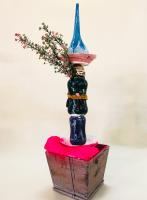 No centro de todos os poderes imperialistas, Portugal incluído, existiu sempre uma incrível habilidade para esquecer, uma fábrica incrível de esquecimento. A tarefa dos artistas, escritores e pensadores é de analisar este processo de ‘lembrar e esquecer’.
No centro de todos os poderes imperialistas, Portugal incluído, existiu sempre uma incrível habilidade para esquecer, uma fábrica incrível de esquecimento. A tarefa dos artistas, escritores e pensadores é de analisar este processo de ‘lembrar e esquecer’.
23.01.2019 | by George Shire
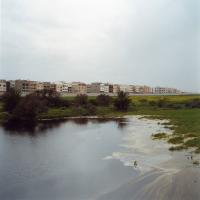 This exhibition addresses the question of cities and their connectivity in the Mediterranean over two radically different time periods. The first section follows a well known historical and geographical sequence through time and space, the Mediterranean of the 16th and 17th centuries, by exploring the connections between six cities (three from the Hapsburg Empire, and three from the Ottoman Empire) which were allied, in opposition, or in a power dynamic of domination. Here the itinerary of the exhibition reflects the geographical space of the Mediterranean : visitors enter in the east by Istanbul, circulate towards Venice and Algiers, before approaching the western part of the Mediterranean, from Genoa to Seville, concluding in Lisbon, the opening to the Atlantic. In the second section, the exhibition presents the cities of the contemporary Mediterranean : two metropolises (Marseille and Casablanca) and two megacities (Istanbul and Cairo).
This exhibition addresses the question of cities and their connectivity in the Mediterranean over two radically different time periods. The first section follows a well known historical and geographical sequence through time and space, the Mediterranean of the 16th and 17th centuries, by exploring the connections between six cities (three from the Hapsburg Empire, and three from the Ottoman Empire) which were allied, in opposition, or in a power dynamic of domination. Here the itinerary of the exhibition reflects the geographical space of the Mediterranean : visitors enter in the east by Istanbul, circulate towards Venice and Algiers, before approaching the western part of the Mediterranean, from Genoa to Seville, concluding in Lisbon, the opening to the Atlantic. In the second section, the exhibition presents the cities of the contemporary Mediterranean : two metropolises (Marseille and Casablanca) and two megacities (Istanbul and Cairo).
15.10.2018 | by vários
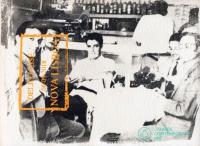 Taking these portraits as a starting point, what segregation does is to create contradictory sentiments between the delectable nostalgia of a privileged minority and the disavowal of a brutally exploited majority. All of history can be interpreted in multiple ways, like a work of art, and in Jasse’s work the myriad readings available to the observer are left open in an approach that is utterly unpretentious.
Taking these portraits as a starting point, what segregation does is to create contradictory sentiments between the delectable nostalgia of a privileged minority and the disavowal of a brutally exploited majority. All of history can be interpreted in multiple ways, like a work of art, and in Jasse’s work the myriad readings available to the observer are left open in an approach that is utterly unpretentious.
14.09.2018 | by Kiluanji Kia Henda
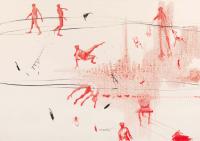 Creating this illusion of a post-utopian world that conceals war has a price: the absence in those three days and in that space of any type of explicit conflict, even contradiction: there is no place for the conflict of generations, gender, music, of tents of national and international producers, and so on.
Creating this illusion of a post-utopian world that conceals war has a price: the absence in those three days and in that space of any type of explicit conflict, even contradiction: there is no place for the conflict of generations, gender, music, of tents of national and international producers, and so on.
09.09.2018 | by António Pinto Ribeiro
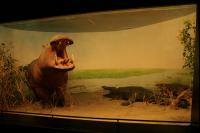 The newly modernised Central African Museum at Teruvren does not do away with the old, nor does it resolve the question of what purpose an African museum serves in Europe, today. Instead, those visiting when it re-opens will be confronted with the uneasy relationship between past and present that Tervuren will always embody - and with the lingering presence of King Leopold's ghost.
The newly modernised Central African Museum at Teruvren does not do away with the old, nor does it resolve the question of what purpose an African museum serves in Europe, today. Instead, those visiting when it re-opens will be confronted with the uneasy relationship between past and present that Tervuren will always embody - and with the lingering presence of King Leopold's ghost.
26.05.2018 | by Ana Naomi de Sousa
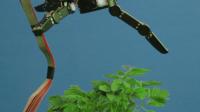 Permanecemos incapazes de escutar e compreender o diálogo entre uma androide ameríndia e o milho transgénico – a quem pertence a humanidade, afinal de contas? Para a coexistência destas diferentes cosmologias – modernas, animistas ou tecnofílicas – não existe sonho ou ficção capaz de as apreender num todo, apenas a perceção de que o mundo lhes dá lugar incessantemente e que a posição de inimigo, mais do que a natureza ou a cultura, marca as suas fronteiras.
Permanecemos incapazes de escutar e compreender o diálogo entre uma androide ameríndia e o milho transgénico – a quem pertence a humanidade, afinal de contas? Para a coexistência destas diferentes cosmologias – modernas, animistas ou tecnofílicas – não existe sonho ou ficção capaz de as apreender num todo, apenas a perceção de que o mundo lhes dá lugar incessantemente e que a posição de inimigo, mais do que a natureza ou a cultura, marca as suas fronteiras.
10.07.2017 | by Pedro Lapa
 Miranda’s work is deeply marked by family memories and experiences and, more broadly, by the collective histories of Portugal and Angola. In Panorama, her focus on the psychic and physical remnants of several pasts – colonial, post-independence, post-Cold War, post-civil war – within natural, urban and architectural landscapes of Luanda and beyond serves the larger purpose of examining the contradictions of the present and imagining alternative futures.
Miranda’s work is deeply marked by family memories and experiences and, more broadly, by the collective histories of Portugal and Angola. In Panorama, her focus on the psychic and physical remnants of several pasts – colonial, post-independence, post-Cold War, post-civil war – within natural, urban and architectural landscapes of Luanda and beyond serves the larger purpose of examining the contradictions of the present and imagining alternative futures.
05.07.2017 | by Ana Balona de Oliveira
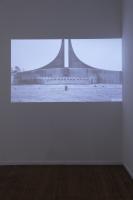 The idea of freedom as a point of arrival – an accomplishment that lies behind us, materialized and monumentalized; freedom as a ballot, a single gesture hinged to a turning point; freedom carved in stone, set on a hill, allegorized in a recognizable form; freedom as a lofty place we ascend to, is one that can be counterpoised to freedom as departure, as work and process; an immaterial, contingent ideal; an ambition and responsibility which escapes and evades one’s grasp, but to which one continuously commits.
The idea of freedom as a point of arrival – an accomplishment that lies behind us, materialized and monumentalized; freedom as a ballot, a single gesture hinged to a turning point; freedom carved in stone, set on a hill, allegorized in a recognizable form; freedom as a lofty place we ascend to, is one that can be counterpoised to freedom as departure, as work and process; an immaterial, contingent ideal; an ambition and responsibility which escapes and evades one’s grasp, but to which one continuously commits.
08.06.2017 | by Nancy Dantas
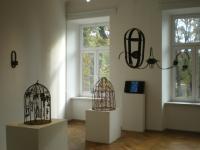 For centuries enslaved Africans were taken to Europe and America to serve as workforce. These individuals were forced into submission and considered sub-human. They were brutalized and treated worse than animals by other individuals, and their institutions, which thought of themselves as civilized and modern. These enslaved men and women suffered and despaired, and dreamt of a life before, and of a land more familiar and kind. So, out of the insanity of misery and helplessness, they would eat the soil in the hope of being taken back to that time and land of before.
For centuries enslaved Africans were taken to Europe and America to serve as workforce. These individuals were forced into submission and considered sub-human. They were brutalized and treated worse than animals by other individuals, and their institutions, which thought of themselves as civilized and modern. These enslaved men and women suffered and despaired, and dreamt of a life before, and of a land more familiar and kind. So, out of the insanity of misery and helplessness, they would eat the soil in the hope of being taken back to that time and land of before.
10.11.2016 | by Ana Rita Canhão
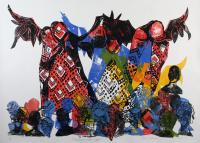 For other mediums such as sound art and video art to gain traction in Afrika, I think they need to be taken out of the gallery or museum environment and put into the mobile environment where people are. This entails modifying the model of collecting, where alternative commercial models better suited to mobile consumption of content come to the fore. The onus is on these new art platforms in Afrika to look deep within their cultures and societies and innovate the mediums themselves to make art more relevant for their communities.
For other mediums such as sound art and video art to gain traction in Afrika, I think they need to be taken out of the gallery or museum environment and put into the mobile environment where people are. This entails modifying the model of collecting, where alternative commercial models better suited to mobile consumption of content come to the fore. The onus is on these new art platforms in Afrika to look deep within their cultures and societies and innovate the mediums themselves to make art more relevant for their communities.
14.10.2015 | by Inês Valle
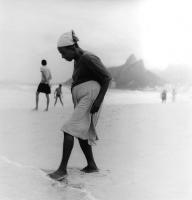 BRASIL is a photobook project that is the result of eight years of photographing culture, landscape, architecture and the visual magic I found in Rio de Janeiro, Sao Paulo and Salvador de Bahia. Made on analog film, the photographs are personal portraits that illuminate a fluid, syncopated, and complex contemporary Brazil, seen through the lens of my Rolleiflex camera.
BRASIL is a photobook project that is the result of eight years of photographing culture, landscape, architecture and the visual magic I found in Rio de Janeiro, Sao Paulo and Salvador de Bahia. Made on analog film, the photographs are personal portraits that illuminate a fluid, syncopated, and complex contemporary Brazil, seen through the lens of my Rolleiflex camera.
30.09.2015 | by Kristin Capp
 The Olympic Winter Games in Sochi, Russia started on February 7 with the Opening Ceremony, where 88 athletes bearing the flags of their respective nations led their national delegations into the Olympic Stadium. When a lonely man representing Zimbabwe entered on position 26, one could have asked two questions: Why is a Zimbabwean the 26th, if there is an alphabetical order? And, probably more interesting, what is a man from the southern Africa doing at Olympic Winter Games?
The Olympic Winter Games in Sochi, Russia started on February 7 with the Opening Ceremony, where 88 athletes bearing the flags of their respective nations led their national delegations into the Olympic Stadium. When a lonely man representing Zimbabwe entered on position 26, one could have asked two questions: Why is a Zimbabwean the 26th, if there is an alphabetical order? And, probably more interesting, what is a man from the southern Africa doing at Olympic Winter Games?
26.02.2014 | by Robin Nuss
 Researching the relations between ongoing artistic, social and political forms of life, Generative Indirections intends to explore the potentialities of performance studies in the critical space between the Social Sciences, Humanities and Art, and give voice to counter hegemonic epistemologies, blurring theory and practice. In-direction thus becomes a magnetic field, moving between theory and practice, challenging disciplinary boundaries in order to question how Performance Studies can be received in Portugal.
Researching the relations between ongoing artistic, social and political forms of life, Generative Indirections intends to explore the potentialities of performance studies in the critical space between the Social Sciences, Humanities and Art, and give voice to counter hegemonic epistemologies, blurring theory and practice. In-direction thus becomes a magnetic field, moving between theory and practice, challenging disciplinary boundaries in order to question how Performance Studies can be received in Portugal.
01.09.2013 | by Baldio
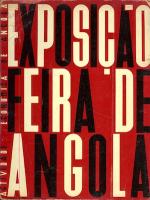 Two years before the Exhibition of the Portuguese World (“Exposição de Mundo Português”), a very large Exhibition-Fair was held in Luanda, that did not go down in colonial history. Its was meant to display the economic development of Angola in an "expressive and comprehensive documentary", rather than exalt the regime's historicist programme and imperial mystique - the norm with colonial exhibitions, such as the Historical Exhibition of the Occupation (“Exposição Histórica da Ocupação”) held in 1937, in the Eduardo VII Park in Lisbon.
Two years before the Exhibition of the Portuguese World (“Exposição de Mundo Português”), a very large Exhibition-Fair was held in Luanda, that did not go down in colonial history. Its was meant to display the economic development of Angola in an "expressive and comprehensive documentary", rather than exalt the regime's historicist programme and imperial mystique - the norm with colonial exhibitions, such as the Historical Exhibition of the Occupation (“Exposição Histórica da Ocupação”) held in 1937, in the Eduardo VII Park in Lisbon.
23.03.2013 | by Alexandre Pomar
 Vela 691 is the code name of the US satellite that detected the nuclear blast performed by South Africa on the 22nd of September in 1979. The test was conducted in the South Atlantic off the cost of Antarctica. It's also the name of a new piece Victor Gama composed by invitation from the Chicago Symphony Orchestra. The piece was premiered during the concert series MusicNOW at Harris Theatre in Chicago on the 5th of March 2012 and was a result of an invitation from composers-in-residence Mason Bates and Anna Clyne.
Vela 691 is the code name of the US satellite that detected the nuclear blast performed by South Africa on the 22nd of September in 1979. The test was conducted in the South Atlantic off the cost of Antarctica. It's also the name of a new piece Victor Gama composed by invitation from the Chicago Symphony Orchestra. The piece was premiered during the concert series MusicNOW at Harris Theatre in Chicago on the 5th of March 2012 and was a result of an invitation from composers-in-residence Mason Bates and Anna Clyne.
07.01.2013 | by vários
 This space, therefore, has huge symbolic significance as a place to host an exhibition about contemporary prisons, and it matters that the two distinct narratives are not confounded. The Portuguese Prison Photo Project invites its viewers to consider the work of two photographers on regular prisons in Democratic Portugal of the 21st century, accompanied by other photographs of prisons selected from diverse national archives.
This space, therefore, has huge symbolic significance as a place to host an exhibition about contemporary prisons, and it matters that the two distinct narratives are not confounded. The Portuguese Prison Photo Project invites its viewers to consider the work of two photographers on regular prisons in Democratic Portugal of the 21st century, accompanied by other photographs of prisons selected from diverse national archives.  My talk will discuss the altered ecology of belonging that has emerged into Africa’s diasporas during the decades since “Black Atlantic” was published. My discussion of the problems that this has raised will centre on several key themes. They include the fortification of the overdeveloped countries, the impact of new communicative technologies on conceptions of solidarity, relationality and mutuality, the resurgence of extractive capitalism, and the export of generic racial identities from the USA to the whole world.
My talk will discuss the altered ecology of belonging that has emerged into Africa’s diasporas during the decades since “Black Atlantic” was published. My discussion of the problems that this has raised will centre on several key themes. They include the fortification of the overdeveloped countries, the impact of new communicative technologies on conceptions of solidarity, relationality and mutuality, the resurgence of extractive capitalism, and the export of generic racial identities from the USA to the whole world.  The title of the conference incorporates the tensions, ambiguities and paradoxes of Blackness in Europe. At the same time as black histories, cultures and social conditions are made invisible in hegemonic accounts on Europe, there is a hypervisibility and presence of black stereotyping in European popular culture. Also, while the concept of race has largely disappeared from political, sociological and administrative discourses (in continental Europe), and while the disengagement with institutional and structural racism has been reframed in new capitalist post racial rhetorics, racial markers still have currency, and black bodies continue to be invoked as either tolerated guests at best, or threatening intruders at worst. The consequence is the practice of “embodying an identity that is declared impossible even though lived by millions”, namely as non-white Europeans, and specifically as Black Europeans. This identity has become even more conditioned by a new mainstreaming of right-wing discourses and the tightening immigrant and refugee policies that affect people of African descent.
The title of the conference incorporates the tensions, ambiguities and paradoxes of Blackness in Europe. At the same time as black histories, cultures and social conditions are made invisible in hegemonic accounts on Europe, there is a hypervisibility and presence of black stereotyping in European popular culture. Also, while the concept of race has largely disappeared from political, sociological and administrative discourses (in continental Europe), and while the disengagement with institutional and structural racism has been reframed in new capitalist post racial rhetorics, racial markers still have currency, and black bodies continue to be invoked as either tolerated guests at best, or threatening intruders at worst. The consequence is the practice of “embodying an identity that is declared impossible even though lived by millions”, namely as non-white Europeans, and specifically as Black Europeans. This identity has become even more conditioned by a new mainstreaming of right-wing discourses and the tightening immigrant and refugee policies that affect people of African descent.  The exhibition Lost Lover speaks about the political, historical and geographical conditions through which knowledge is produced and controlled. The screening program assembled by Lara Koseff was originally presented in Rio de Janeiro, in the courtyard of Lanchonete, now in Rampa, Porto.
In the front room, 11 single-channel video pieces are projected in a loop. The authors, who are mostly from South Africa, confront us with the abandon of fear, thus calling to action topics that are often and strategically silenced.
The exhibition Lost Lover speaks about the political, historical and geographical conditions through which knowledge is produced and controlled. The screening program assembled by Lara Koseff was originally presented in Rio de Janeiro, in the courtyard of Lanchonete, now in Rampa, Porto.
In the front room, 11 single-channel video pieces are projected in a loop. The authors, who are mostly from South Africa, confront us with the abandon of fear, thus calling to action topics that are often and strategically silenced.  The title of the exhibition refers to Trotsky’s theory of uneven and combined development and, particularly, to its rereading by Harvey through the concept of “uneven geographical development”. If Marx considers that space is annihilated by time in the capitalist system, The Unbalanced Land carries out a reflection on the modalities of space production and the spatio-temporal relations in late capitalism.
The title of the exhibition refers to Trotsky’s theory of uneven and combined development and, particularly, to its rereading by Harvey through the concept of “uneven geographical development”. If Marx considers that space is annihilated by time in the capitalist system, The Unbalanced Land carries out a reflection on the modalities of space production and the spatio-temporal relations in late capitalism.  No centro de todos os poderes imperialistas, Portugal incluído, existiu sempre uma incrível habilidade para esquecer, uma fábrica incrível de esquecimento. A tarefa dos artistas, escritores e pensadores é de analisar este processo de ‘lembrar e esquecer’.
No centro de todos os poderes imperialistas, Portugal incluído, existiu sempre uma incrível habilidade para esquecer, uma fábrica incrível de esquecimento. A tarefa dos artistas, escritores e pensadores é de analisar este processo de ‘lembrar e esquecer’.  This exhibition addresses the question of cities and their connectivity in the Mediterranean over two radically different time periods. The first section follows a well known historical and geographical sequence through time and space, the Mediterranean of the 16th and 17th centuries, by exploring the connections between six cities (three from the Hapsburg Empire, and three from the Ottoman Empire) which were allied, in opposition, or in a power dynamic of domination. Here the itinerary of the exhibition reflects the geographical space of the Mediterranean : visitors enter in the east by Istanbul, circulate towards Venice and Algiers, before approaching the western part of the Mediterranean, from Genoa to Seville, concluding in Lisbon, the opening to the Atlantic. In the second section, the exhibition presents the cities of the contemporary Mediterranean : two metropolises (Marseille and Casablanca) and two megacities (Istanbul and Cairo).
This exhibition addresses the question of cities and their connectivity in the Mediterranean over two radically different time periods. The first section follows a well known historical and geographical sequence through time and space, the Mediterranean of the 16th and 17th centuries, by exploring the connections between six cities (three from the Hapsburg Empire, and three from the Ottoman Empire) which were allied, in opposition, or in a power dynamic of domination. Here the itinerary of the exhibition reflects the geographical space of the Mediterranean : visitors enter in the east by Istanbul, circulate towards Venice and Algiers, before approaching the western part of the Mediterranean, from Genoa to Seville, concluding in Lisbon, the opening to the Atlantic. In the second section, the exhibition presents the cities of the contemporary Mediterranean : two metropolises (Marseille and Casablanca) and two megacities (Istanbul and Cairo).  Taking these portraits as a starting point, what segregation does is to create contradictory sentiments between the delectable nostalgia of a privileged minority and the disavowal of a brutally exploited majority. All of history can be interpreted in multiple ways, like a work of art, and in Jasse’s work the myriad readings available to the observer are left open in an approach that is utterly unpretentious.
Taking these portraits as a starting point, what segregation does is to create contradictory sentiments between the delectable nostalgia of a privileged minority and the disavowal of a brutally exploited majority. All of history can be interpreted in multiple ways, like a work of art, and in Jasse’s work the myriad readings available to the observer are left open in an approach that is utterly unpretentious.  Creating this illusion of a post-utopian world that conceals war has a price: the absence in those three days and in that space of any type of explicit conflict, even contradiction: there is no place for the conflict of generations, gender, music, of tents of national and international producers, and so on.
Creating this illusion of a post-utopian world that conceals war has a price: the absence in those three days and in that space of any type of explicit conflict, even contradiction: there is no place for the conflict of generations, gender, music, of tents of national and international producers, and so on.  The newly modernised Central African Museum at Teruvren does not do away with the old, nor does it resolve the question of what purpose an African museum serves in Europe, today. Instead, those visiting when it re-opens will be confronted with the uneasy relationship between past and present that Tervuren will always embody - and with the lingering presence of King Leopold's ghost.
The newly modernised Central African Museum at Teruvren does not do away with the old, nor does it resolve the question of what purpose an African museum serves in Europe, today. Instead, those visiting when it re-opens will be confronted with the uneasy relationship between past and present that Tervuren will always embody - and with the lingering presence of King Leopold's ghost.  Permanecemos incapazes de escutar e compreender o diálogo entre uma androide ameríndia e o milho transgénico – a quem pertence a humanidade, afinal de contas? Para a coexistência destas diferentes cosmologias – modernas, animistas ou tecnofílicas – não existe sonho ou ficção capaz de as apreender num todo, apenas a perceção de que o mundo lhes dá lugar incessantemente e que a posição de inimigo, mais do que a natureza ou a cultura, marca as suas fronteiras.
Permanecemos incapazes de escutar e compreender o diálogo entre uma androide ameríndia e o milho transgénico – a quem pertence a humanidade, afinal de contas? Para a coexistência destas diferentes cosmologias – modernas, animistas ou tecnofílicas – não existe sonho ou ficção capaz de as apreender num todo, apenas a perceção de que o mundo lhes dá lugar incessantemente e que a posição de inimigo, mais do que a natureza ou a cultura, marca as suas fronteiras.  Miranda’s work is deeply marked by family memories and experiences and, more broadly, by the collective histories of Portugal and Angola. In Panorama, her focus on the psychic and physical remnants of several pasts – colonial, post-independence, post-Cold War, post-civil war – within natural, urban and architectural landscapes of Luanda and beyond serves the larger purpose of examining the contradictions of the present and imagining alternative futures.
Miranda’s work is deeply marked by family memories and experiences and, more broadly, by the collective histories of Portugal and Angola. In Panorama, her focus on the psychic and physical remnants of several pasts – colonial, post-independence, post-Cold War, post-civil war – within natural, urban and architectural landscapes of Luanda and beyond serves the larger purpose of examining the contradictions of the present and imagining alternative futures.  The idea of freedom as a point of arrival – an accomplishment that lies behind us, materialized and monumentalized; freedom as a ballot, a single gesture hinged to a turning point; freedom carved in stone, set on a hill, allegorized in a recognizable form; freedom as a lofty place we ascend to, is one that can be counterpoised to freedom as departure, as work and process; an immaterial, contingent ideal; an ambition and responsibility which escapes and evades one’s grasp, but to which one continuously commits.
The idea of freedom as a point of arrival – an accomplishment that lies behind us, materialized and monumentalized; freedom as a ballot, a single gesture hinged to a turning point; freedom carved in stone, set on a hill, allegorized in a recognizable form; freedom as a lofty place we ascend to, is one that can be counterpoised to freedom as departure, as work and process; an immaterial, contingent ideal; an ambition and responsibility which escapes and evades one’s grasp, but to which one continuously commits.  For centuries enslaved Africans were taken to Europe and America to serve as workforce. These individuals were forced into submission and considered sub-human. They were brutalized and treated worse than animals by other individuals, and their institutions, which thought of themselves as civilized and modern. These enslaved men and women suffered and despaired, and dreamt of a life before, and of a land more familiar and kind. So, out of the insanity of misery and helplessness, they would eat the soil in the hope of being taken back to that time and land of before.
For centuries enslaved Africans were taken to Europe and America to serve as workforce. These individuals were forced into submission and considered sub-human. They were brutalized and treated worse than animals by other individuals, and their institutions, which thought of themselves as civilized and modern. These enslaved men and women suffered and despaired, and dreamt of a life before, and of a land more familiar and kind. So, out of the insanity of misery and helplessness, they would eat the soil in the hope of being taken back to that time and land of before.  For other mediums such as sound art and video art to gain traction in Afrika, I think they need to be taken out of the gallery or museum environment and put into the mobile environment where people are. This entails modifying the model of collecting, where alternative commercial models better suited to mobile consumption of content come to the fore. The onus is on these new art platforms in Afrika to look deep within their cultures and societies and innovate the mediums themselves to make art more relevant for their communities.
For other mediums such as sound art and video art to gain traction in Afrika, I think they need to be taken out of the gallery or museum environment and put into the mobile environment where people are. This entails modifying the model of collecting, where alternative commercial models better suited to mobile consumption of content come to the fore. The onus is on these new art platforms in Afrika to look deep within their cultures and societies and innovate the mediums themselves to make art more relevant for their communities.  BRASIL is a photobook project that is the result of eight years of photographing culture, landscape, architecture and the visual magic I found in Rio de Janeiro, Sao Paulo and Salvador de Bahia. Made on analog film, the photographs are personal portraits that illuminate a fluid, syncopated, and complex contemporary Brazil, seen through the lens of my Rolleiflex camera.
BRASIL is a photobook project that is the result of eight years of photographing culture, landscape, architecture and the visual magic I found in Rio de Janeiro, Sao Paulo and Salvador de Bahia. Made on analog film, the photographs are personal portraits that illuminate a fluid, syncopated, and complex contemporary Brazil, seen through the lens of my Rolleiflex camera.  The Olympic Winter Games in Sochi, Russia started on February 7 with the Opening Ceremony, where 88 athletes bearing the flags of their respective nations led their national delegations into the Olympic Stadium. When a lonely man representing Zimbabwe entered on position 26, one could have asked two questions: Why is a Zimbabwean the 26th, if there is an alphabetical order? And, probably more interesting, what is a man from the southern Africa doing at Olympic Winter Games?
The Olympic Winter Games in Sochi, Russia started on February 7 with the Opening Ceremony, where 88 athletes bearing the flags of their respective nations led their national delegations into the Olympic Stadium. When a lonely man representing Zimbabwe entered on position 26, one could have asked two questions: Why is a Zimbabwean the 26th, if there is an alphabetical order? And, probably more interesting, what is a man from the southern Africa doing at Olympic Winter Games?  Researching the relations between ongoing artistic, social and political forms of life, Generative Indirections intends to explore the potentialities of performance studies in the critical space between the Social Sciences, Humanities and Art, and give voice to counter hegemonic epistemologies, blurring theory and practice. In-direction thus becomes a magnetic field, moving between theory and practice, challenging disciplinary boundaries in order to question how Performance Studies can be received in Portugal.
Researching the relations between ongoing artistic, social and political forms of life, Generative Indirections intends to explore the potentialities of performance studies in the critical space between the Social Sciences, Humanities and Art, and give voice to counter hegemonic epistemologies, blurring theory and practice. In-direction thus becomes a magnetic field, moving between theory and practice, challenging disciplinary boundaries in order to question how Performance Studies can be received in Portugal.  Two years before the Exhibition of the Portuguese World (“Exposição de Mundo Português”), a very large Exhibition-Fair was held in Luanda, that did not go down in colonial history. Its was meant to display the economic development of Angola in an "expressive and comprehensive documentary", rather than exalt the regime's historicist programme and imperial mystique - the norm with colonial exhibitions, such as the Historical Exhibition of the Occupation (“Exposição Histórica da Ocupação”) held in 1937, in the Eduardo VII Park in Lisbon.
Two years before the Exhibition of the Portuguese World (“Exposição de Mundo Português”), a very large Exhibition-Fair was held in Luanda, that did not go down in colonial history. Its was meant to display the economic development of Angola in an "expressive and comprehensive documentary", rather than exalt the regime's historicist programme and imperial mystique - the norm with colonial exhibitions, such as the Historical Exhibition of the Occupation (“Exposição Histórica da Ocupação”) held in 1937, in the Eduardo VII Park in Lisbon.  Vela 691 is the code name of the US satellite that detected the nuclear blast performed by South Africa on the 22nd of September in 1979. The test was conducted in the South Atlantic off the cost of Antarctica. It's also the name of a new piece Victor Gama composed by invitation from the Chicago Symphony Orchestra. The piece was premiered during the concert series MusicNOW at Harris Theatre in Chicago on the 5th of March 2012 and was a result of an invitation from composers-in-residence Mason Bates and Anna Clyne.
Vela 691 is the code name of the US satellite that detected the nuclear blast performed by South Africa on the 22nd of September in 1979. The test was conducted in the South Atlantic off the cost of Antarctica. It's also the name of a new piece Victor Gama composed by invitation from the Chicago Symphony Orchestra. The piece was premiered during the concert series MusicNOW at Harris Theatre in Chicago on the 5th of March 2012 and was a result of an invitation from composers-in-residence Mason Bates and Anna Clyne. 
